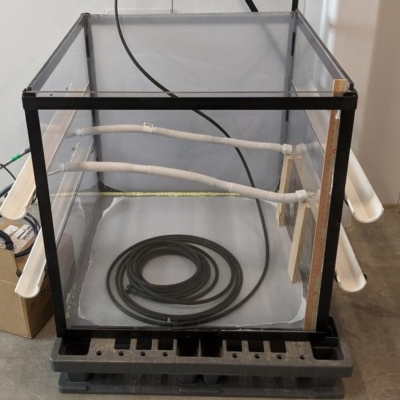Significance of Proposed work
The longevity and performance of a pavement section depend on the characteristics of the subgrade soil. A majority of the pavements in North Texas are constructed on expansive soils. The deterioration of the pavement performance due to rutting, cracking, and differential heaving is a regular phenomenon in the regions predominantly distributed with expansive soils. The pavements, particularly those built for low-volume traffic conditions, experience distress due to the high swelling and shrinkage characteristics of the underlying problematic soils. Geosynthetics have been traditionally used to improve such poor subgrades due to their many benefits, such as ease of installation, ample mechanical and hydraulic properties. In the last decade, a newly available wicking geotextile, with a moisture redistribution capacity, has been developed to improve the performance of pavements constructed over expansive and frozen soils. In this study, a small-scale laboratory and field studies are being conducted to comprehend the wicking ability of this innovative geotextile in an expansive soil environment.
Objectives
- The primary objective of this project is to analyze the performance of a newly-available wicking geotextile layer used at the interface of the base and subgrade layers on highly expansive soil.
- Small-scale laboratory and full-scale field studies are undertaken to understand the wicking ability in controlled and field environments, respectively.
- Develop a comprehensive numerical model to simulate the behavior of wicking geotextile and perform several parametric studies to understand the influence of different factors affecting moisture migration.
- Develop a Life-Cycle Cost Analysis (LCCA) framework for the application of geotextile.
Scope of work
- Field test sections were constructed near FM 1807, Venus Texas. A comparative study was performed to understand the influence of different fill materials (Reclaimed Asphalt Pavement (RAP)aggregates and crushed stone aggregates) in the base layer.
- The constructed field sections are instrumented with Shape Array Accelerometer (SAA) sensors, Earth Pressure Cells (EPC), and Moisture Sensors (MS) for measuring deflection, vertical stress, and moisture content, respectively.
- Laboratory studies are being performed in a small-scale box to understand the moisture migration pattern due to the presence of wicking fibers.
- Development of a FEM/FDM- based numerical model.
- Predicting the Life Cycle Cost of using this novel geotextile in pavement infrastructure.
Research Plan

Tasks Accomplished
- Construction of Pavement Section at FM-1807, Venus Texas and subsequent Data Monitoring.
- Construction of Small-Scale Box for laboratory studies.
Work Planned
- Monitoring pavement performance for another 3 years
- Monitoring performance of the wicking geotextile in small-scale laboratory study.
- Developing LCCA framework and numerical model
Impact on the state of Practice
The construction of pavement sections using this wicking geotextile over highly expansive subgrades is expected to provide new insights regarding the long-term performance of such pavements. Moreover, the utilization of poor-quality aggregates in the base layer, in combination with this geotextile, could provide a sustainable alternative to existing design guidelines for TxDOT and other state DOTs in general.


